| Objection! | |
|---|---|
 | |
| Developer(s) | Ashley Lipson |
| Publisher(s) | TransMedia Productions |
| Platform(s) | MS-DOS |
| Release | 1992 |
| Genre(s) | Simulation |
Objection! is legal simulation video game for MS-DOS published by TransMedia Productions in 1992.
| Objection! | |
|---|---|
 | |
| Developer(s) | Ashley Lipson |
| Publisher(s) | TransMedia Productions |
| Platform(s) | MS-DOS |
| Release | 1992 |
| Genre(s) | Simulation |
Objection! is legal simulation video game for MS-DOS published by TransMedia Productions in 1992.
Objection! is a game which is aimed at improving the evidentiary law capabilities for a practicing trial lawyer. [1]
Objection! was programmed by Ashley Lipson, Professor of Law. [2]
Jasper Sylvester reviewed the game for Computer Gaming World , and stated that "we find the program suitable for those who want a challenge that is cerebral, realistic and intense. Case dismissed." [1]
Aurora Dizon for PC World said "Objection! a game you don't play to win, but win by playing." [3]

A video game or computer game is an electronic game that involves interaction with a user interface or input device to generate visual feedback from a display device, most commonly shown in a video format on a television set, computer monitor, flat-panel display or touchscreen on handheld devices, or a virtual reality headset. Most modern video games are audiovisual, with audio complement delivered through speakers or headphones, and sometimes also with other types of sensory feedback, and some video games also allow microphone and webcam inputs for in-game chatting and livestreaming.
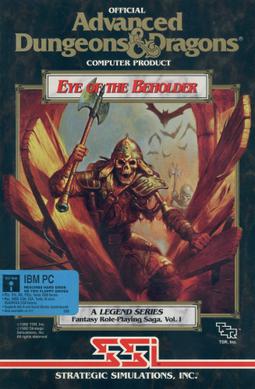
Eye of the Beholder is a role-playing video game for personal computers and video game consoles developed by Westwood Associates. It was published by Strategic Simulations, Inc. in 1991, for the MS-DOS operating system and later ported to the Amiga, the Sega CD and the SNES. The Sega CD version features a soundtrack composed by Yuzo Koshiro and Motohiro Kawashima. A port to the Atari Lynx handheld was developed by NuFX in 1993, but was not released. In 2002, an adaptation of the same name was developed by Pronto Games for the Game Boy Advance.
Strategic Simulations, Inc. (SSI) was a video game developer and publisher with over 100 titles to its credit from its founding in 1979 to its dissolution in 1994. The company was especially noted for its numerous wargames, its official computer game adaptations of Dungeons & Dragons, and for the groundbreaking Panzer General series.

Don Daglow is an American video game designer, programmer, and producer. He is best known for being the creator of early games from several different genres, including pioneering simulation game Utopia for Intellivision in 1981, role-playing game Dungeon in 1975, sports games including the first interactive computer baseball game Baseball in 1971, and the first graphical MMORPG, Neverwinter Nights in 1991. He founded long-standing game developer Stormfront Studios in 1988.
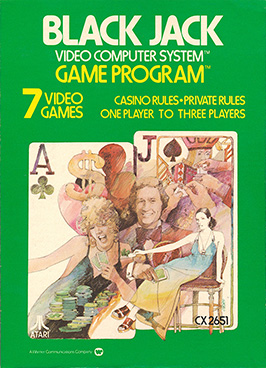
Blackjack is a video game simulation of blackjack programmed by Bob Whitehead and published by Atari, Inc. for its Video Computer System. The game was one of the nine launch titles available when the Atari 2600 went on sale in September 1977. The objective is identical to the card game: to beat the dealer's card total, without going over 21, to win a bet. One to three players play the computer dealer.
Life simulation games form a subgenre of simulation video games in which the player lives or controls one or more virtual characters. Such a game can revolve around "individuals and relationships, or it could be a simulation of an ecosystem". Other terms include artificial life game and simulated life game (SLG).

The simulation hypothesis proposes that what we experience as the world is actually a simulated reality, such as a computer simulation in which we ourselves are constructs. There has been much debate over this topic, ranging from philosophical discourse to practical applications in computing.

In computing, an emulator is hardware or software that enables one computer system to behave like another computer system. An emulator typically enables the host system to run software or use peripheral devices designed for the guest system. Emulation refers to the ability of a computer program in an electronic device to emulate another program or device.
The history of video games spans a period of time between the invention of the first electronic games and today, covering many inventions and developments. Video gaming reached mainstream popularity in the 1970s and 1980s, when arcade video games, gaming consoles and home computer games were introduced to the general public. Since then, video gaming has become a popular form of entertainment and a part of modern culture in most parts of the world. The early history of video games, therefore, covers the period of time between the first interactive electronic game with an electronic display in 1947, the first true video games in the early 1950s, and the rise of early arcade video games in the 1970s. During this time there was a wide range of devices and inventions corresponding with large advances in computing technology, and the actual first video game is dependent on the definition of "video game" used.
Procedural rhetoric or simulation rhetoric is a rhetorical concept that explains how people learn through the authorship of rules and processes. The theory argues that games can make strong claims about how the world works—not simply through words or visuals but through the processes they embody and models they construct. The term was first coined by Ian Bogost in his 2007 book Persuasive Games: The Expressive Power of Videogames.

Cartels & Cutthroats is a 1981 video game published by Strategic Simulations.

Reforger '88 is a 1984 computer wargame designed by Gary Grigsby and published by Strategic Simulations. It takes place in a near-future setting and covers a hypothetical conflict between NATO and Warsaw Pact nations.
Video Stock Market is a video game published by Computer Adversary Publishing.
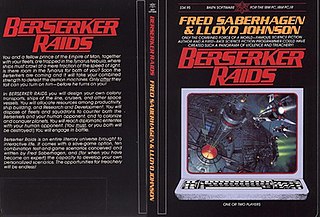
Berserker Raids is a turn-based strategy video game designed by LLoyd Johnson and Fred Saberhagen for the Apple II and published by Baen Software in 1983. It was ported to the Atari 8-bit family, Commodore 64, and DOS.
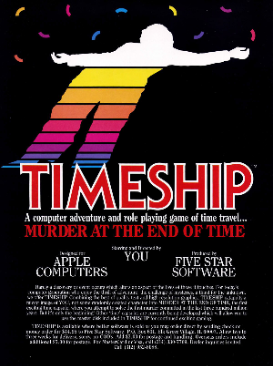
Timeship is a video game published by Five Star Software.
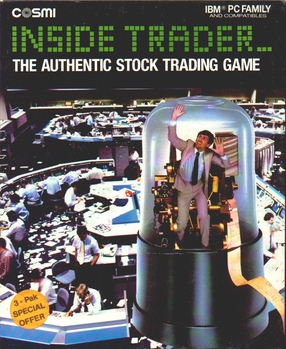
Inside Trader: The Authentic Stock Trading Game is a 1987 video game published by Cosmi Corporation.

BlackJack Academy is a 1988 video game published by MicroIllusions.
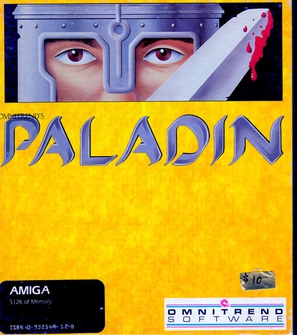
Paladin is a 1988 video game published by Omnitrend Software.

Visions of Aftermath: The Boomtown is a 1988 video game published by Mindscape.